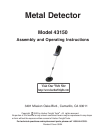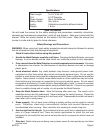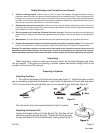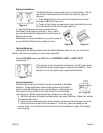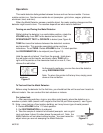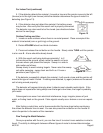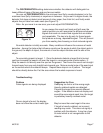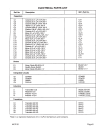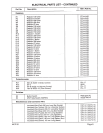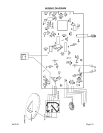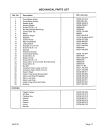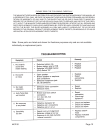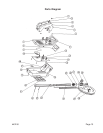
#43150 Page 6
Figure 13
Figure 14
For Indoor Test (continued)
5. If the detector detects the material, it sounds a tone and the pointer moves to the left
(ferrous) or to the right (non-ferrous) while the detector determines the type of metal it is
detecting (see Figure 13).
6. If the detector does not detect the material, the battery power
may be low. Also verify that the search coil is properly connected.
The detector may also need to be fine tuned (see directions below
and on the next page.
Outdoor Testing and Use:
1. Locate an area outdoors where there is no metal present. Place a sample of the
material to be tested (coin or gold ring) on the ground.
2. Rotate VOLUME about two-thirds clockwise.
3. Press and release the red button on the handle. Slowly rotate TUNE until the pointer
is at or near 0. A tone should be barely heard.
4. With the search coil being held approximately 1 to 2
inches above the ground, slowly move the search coil over
the area where you placed the sample. Sweep in a side to
side motion as follows:
Sweep slowly to avoid missing targets. Never raise the sweep
coil while sweeping; sweep back and forth as if it was a
pendulum (see Figure 14).
If the detector successfully detects the material, it will sound a tone and the pointer will
move to the type of metal it found. If nothing was detected, try again (make sure the search
coil is being moved properly).
The detector will respond strongly when it detects most valuable metal oljects. If the
signal does not repeat after being swept over the target a few times, the target is probably
junk metal.
False signals can occur from electrical interference, large, irregular pieces of junk
metal, or finding trash on the ground. False signals usually occur broken or are non-repeat-
able.
After finding a metal item, wait a few seconds after the tone stops before continuing;
this allows the detector time to reset. You can also press the red button on the handle to
return the pointer to the center of the viewmeter.
Fine Tuning the Metal Detector:
Once you practice with the unit, you can fine tune it to make it more selective in what is
found. The ability to distinguish between different types of metal is termed discrimination.



